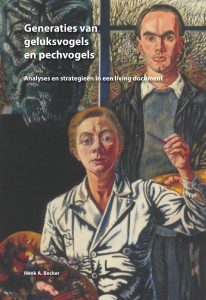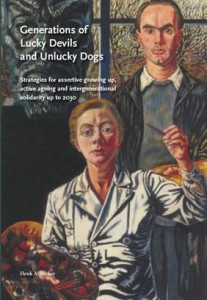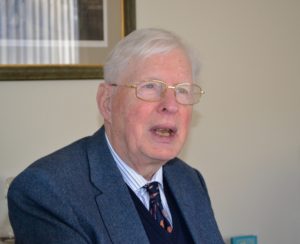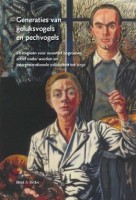On Generations ~ Over Generaties
 Background information ~ Achtergrond
Background information ~ Achtergrond
Karl Mannheims “Problem der Generationen” ~ 80 Jahre danach
Zusammenfassung
Mannheims Generationenbegriff aus seinem 1928 und 1929 erschienen zweiteiligen Artikel über „Das Problem der Generationen“ muss in der Gegenwart teilweise überarbeitet werden. Eine Unterscheidung zwischen Kohortengenerationen und Typologiegenerationen muss ausgearbeitet werden, da seit 1957 Stereotype von Generationen allgemein verbreitet wurden. Auch eine Differenzierung zwischen allgemeinen, partiellen und spezifischen Generationen ist notwendig geworden. Die gegenwärtige soziologische Generationenforschung kann häufig Methoden der Epidemiologieforschung anwenden, wie beispielsweise die Verwendung von Zufallsmodellen. Datenarchive erweitern die Möglichkeiten der Generationsforschung. Die Formativperiode im Lebenslauf ist nicht nur soziologisch, sondern auch biologisch und psychologisch abgegrenzt. Religionsforschung und Familienforschung können von der Generationenforschung profitieren.
Schlagworte: Kohortengeneration; Typologiegeneration; Partielle Generation; Spezifische Generation; Generationsforschung in der Familienforschung
Full text (German): http://henkbecker.com/problem_of_generations.php
Henk A. Becker & Lies van Rijssen ~ Bloemlezing uit de literatuur over afstandsonderwijs (2010)
PDF: http://henkbecker.com/upload/background_book/Bloemlezing.pdf
Symposium Universiteit Utrecht 2006
Programme Science Court
Background study: ‘Verwondering, Verlichting en Schepping in meerder vormen’
Report: ‘Evolution and Creationism’ (case: ‘creativity in science’)
Reports about TRIZ
Meer creativiteit ja, maar niet in plaats van wetenschap
De oorsprong van TRIZ en I-TRIZ
TRIZ-based tools for knowledge creation
TRIZ elects a president
Article about ‘Interdisciplinary Research and Creativity’ (final case Science Court)
Presentations
Becker – Creativiteit in meervoud
Dekker – Geloof en wetenschap
Nienhuis – Requis
Dieks – Intelligent design
De Kempenaer – TRIZ
Stroebe – How to stimulate scientific creativity through funding
Schins – Intelligent design
Hoekstra & Horzinek – Creativiteit in de wetenschap en kunst
Conclusions
PDF & Powerpoints: http://henkbecker.com/symposium.php
News ~ Nieuws
A new wave of change is expected in the working world, as Generation Z – those born in 1995 or later – enter the workplace and millennials occupy management positions this year.
In the audio, Azania Mosaka speaks to Trend Translator Sue Morris and takes a look at how millennials have renewed the organisational culture of businesses and the benefits thereof.
Monika Palmberger ~ How Generations Remember. Conflicting Histories And Shared Memories In Post-War Bosnia And Herzegovina
My study, in concentrating on the role of generational positioning, reveals that past experiences inform present stances, but also shows that it is the actor in the present that gives meaning to the past. This is also true for narratives of the past that are passed on from older to younger generations, and are then scrutinised and contextualised by the latter. It is suggested that people’s sense of continuity can deal with the inconsistencies that arise with this transfer between generations. It is this field of tension between collective and personal, and between persistence and change that is central in the discussion of generational positioning in this book.
Read: http://rozenbergquarterly.com/monika-palmberger-how-generations-remember-conflicting-histories-and-shared-memories-in-post-war-bosnia-and-herzegovina/
Read more
Maatschappijleer is er om de leerlingen te laten functioneren in de samenleving. Een interview met Henk A. Becker
Prof.dr. Henk A. Becker (1933) kijkt opgewekt naar de toekomst. Natuurlijk, ook hij weet dat het er op dit moment niet alleen maar rooskleurig aan toegaat in de samenleving, maar hij ziet de contouren van een nieuwe generatie in opkomst waar hij een positief levensbeeld aan durft te ontlenen.
Auke van der Berg: U noemde een paar keer dat er een schok gaat komen met de nieuwe generatie twintigers. Wat voor schok?
Henk Becker: Dat ze, bijna alle leden van Generatie Z, ongelooflijk meer kennis en vaardigheden ten aanzien van het hanteren van computers hebben dan de vorige generaties.
Daar kunnen ze feitelijk gebruik van maken bijvoorbeeld door ook in het Engels te werken terwijl ze in Nederland zitten. Je kunt je brood verdienen. Of denk aan de jonge Roemenen die programmeren voor Nederlandse ondernemingen. Wat voor die Nederlandse ondernemingen uiteraard belangrijk is omdat de salarissen daar aanmerkelijk lager zijn.
Dat is een praktische vertaling. Het is ook de generatie die op grote schaal de mogelijkheid heeft om op verschillende manieren kennis tot zich nemen. Wat voor invloed heeft dat?
Daardoor zullen ze veel meer dingen kunnen uitvoeren. Op een andere manier geld verdienen dan vorige generaties. Dat studenten via digitale communicatiemiddelen eenzame ouderen begeleiden. De mogelijkheden om je maatschappelijk nuttig te maken, om geld te verdienen, zijn enorm uitgebreid.
Is daar uw optimisme op gestoeld? Ondanks deze warrige tijden.
Ja, omdat de mogelijkheden om actief te zijn, om je geld te verdienen om een reputatie op te bouwen, zo ongelooflijk zijn toegenomen. Daar zit het positieve in.
Maar dit is ook de tijd waarin we worden geconfronteerd met een overvloed aan informatie, op allerlei niveaus. Wat voor invloed heeft dat op ons gedrag?
Dat is onderzoek voor specialisten. Maar voor iedereen in de samenleving, die bijna iedere dag het woord generatie tegenkomt, is het één van de denkwerelden waarmee hij zijn omgeving begrijpt. En waarmee hij op die omgeving inspeelt.
Hoe leer je daarmee om te gaan?
Door te kiezen voor maatschappijleer. Maatschappijleer is er om de leerlingen te laten functioneren in de samenleving. Het moet één van de belangrijkste vakken worden.
Het vak is op de achtergrond geraakt omdat het relatief makkelijk is op het eindexamen. Wis- en natuurkunde is moeilijk omdat het moeilijk is. En de scholen gebruiken het om discipline af te dwingen.
U bent één van de belangrijkste gezichten van het vakgebied Generatie sociologie. Wat is dat, Generatie sociologie?
Generatie sociologie is een onderdeel van de empirische sociologie. Door generaties in te voegen komt er de tijdsdimensie bij in de discussies en publicaties.
Het boeiendste beeld om aan te geven dat er een tijdsdimensie is, is dat van de python. De slang die een groot aantal konijnen ingeslikt heeft. Langzamerhand schuiven die konijnen door dat slangenlichaam heen. Wat betekent dat de kenmerken van een generatie in de loop van de tijden veranderen omdat de leden ouder worden. Dat proces moet je in de gaten houden.
Het vakgebied kreeg voet aan de grond door het essay Das Problem der Generationen van de Hongaars-Duitse socioloog Karl Mannheim. Mannheim stelde dat een generatie een objectieve sociale formatie is, een aanwijsbare groep in de samenleving. Een gezamelijk beleefde historische gebeurtenis zorgt voor binding binnen een leeftijdsgroep. Zijn essay was het antwoord op allerlei esoterische gedachten over de Zeitgeist die toendertijd in zwang waren. Van Generationsimpuls naar Generationszusammenhang zou je samenvattend kunnen zeggen.
Generatie sociologie is boeiend, maar ook gecompliceerd. Je hebt niet één beeld van een generatie dat hetzelfde is. Je moet denken aan een doos waarin meerdere beelden zitten die langzaam in de tijd opschuiven. Daar zitten ook vaak de vergissingen in het weergeven van de zaak.
Het is een enorm breed terrein waar je je mee bezighoudt. Je hebt gedetailleerde beschrijvingen, bijvoorbeeld van het Centraal Planbureau of het Centraal Bureau voor de Statistiek. Daarnaast heb je vereenvoudigde beelden, zogenaamde idealisaties. Wat je in de kranten tegenkomt, zijn meestal idealisaties. Dus de kenmerken van een groep.
In het algemeen spraakgebruik kom je het woord generatie dagelijks tegen. Of de vereenvoudiging, leeftijdscategorieën. De dertigers, veertigers, enzovoorts. Iedereen die in de samenleving functioneert, is in zekere mate generatie-socioloog, zou je kunnen zeggen.
Read more
Henk A. Becker ~ De levensloop van een workaholic ~ Autobiografie
6 augustus 2018 – In alle rust is in zijn eigen studeerkamer overleden Prof.dr. Henk A. Becker (1933 – 2018)
Ten Geleide – Maart 2016
Er zijn vele vormen voor het weergeven van een levensloop. Voor deze biografie heb ik als rode draad het verloop van mijn leven vanaf de geboorte en het begin van mijn werkleven tot het laatste stadium van mijn loopbaan gekozen. Het samenstellen van deze biografie heeft plaatsgevonden als een variant op ‘Sternstunden der Menschheit’ van Stephan Zweig. Telkens komt aan de orde welke effecten een ‘major event’ in mijn leven heeft gehad. Verder is ervan uitgegaan dat de privacy van familieleden, vrienden en kennissen gewaarborgd moet worden. In verband hiermee is telkens wel een naam genoemd maar is verdere informatie over de invloeden vermeden.
2.Eerste levensjaren
Geboren ben ik op 30 mei 1933 in Greifswald aan de Oostzee. Mijn vader had de Duitse nationaliteit. Hij was doctor in de theoretische natuurkunde. Aan de Universiteit van Greifswald was hij verbonden als wetenschappelijk medewerker. Mijn moeder had van oorsprong de Nederlandse nationaliteit. Tot aan haar huwelijk had zij als secretaresse voor mijn Hollandse grootvader op zijn advocatenkantoor gewerkt. Een kleine twee jaar na mijn geboorte kwam mijn jongere broer ter wereld.
Toen ik vier jaar oud was verhuisde ons gezin naar Berlijn. Mijn vader ging werken voor Siemens. Wij gingen wonen in een appartement in Berlin-Siemensstad, een buitenwijk van de stad. Tegenover het appartementengebouw stond een lagere school. Nadat ik de leerplichtige leeftijd had bereikt ben ik daar naar school gegaan.
Mijn vader was geen militair. Hij noemde in huiselijke kring Hitler ‘der Wahnsinskanditat’. De leden van ons gezin kregen van mijn vader te horen: ‘één verkeerd woord en wij zitten me z’n allen in een koncentratiekamp’. Deze dreiging heeft vooral mijn verblijf op de lagere school een krampachtig karakter gegeven.
Het was de tijd van de bombardementen op Berlijn. Meerdere keren per week ging ’s nachts de sirene en daalden wij af naar de schuilkelder onder het flatgebouw. Overdag moesten de docenten en leerlingen van de lagere school vaak naar de schuilkelder vertrekken.
3.Evacuaties en migratie
Om de bombardementen op Berlijn te ontvluchten werden groepen bewoners regelmatig geëvacueerd naar andere delen van Duitsland. De eerste evacuatie van mijn moeder, mijzelf en mijn broer bracht ons naar Beieren. In het wijkje Unterau van Schledorf am Kochelsee woonden wij bij een boerengezin. Vriendelijke, gastvrije mensen. In Schledorf zat ik op de lagere school. Mijn Beierse medeleerlingen hadden de pest aan Duitsers uit het noorden van het land. Vaak kreeg ik te horen: ‘Du Saubub du dreckiger’. Als ‘Saupreusz’ was ik een gehaat individu. Gelukkig bleef het bij uitschelden en kwamen er geen vechtpartijen.De tweede evacuatie vond plaats naar Bernstein, een dorp in de Neumark. Het dorp ligt ten Oosten van Berlijn, aan de andere kant van de Oder, in het huidige Polen. In de naburige stad Arnswalde heb ik nog enkele maanden op een gymnasium gezeten. Totdat het Russische leger oprukte. Mijn moeder besloot om niet samen met ons te vluchten omdat een schoonzuster van haar in een ziekenhuis in een naburige plaats lag. Zij mocht niet alleen worden achtergelaten. Mijn moeder nam de zorg voor de dochter van haar schoonzuster op zich. Read more
Bonus Chapters 2016 ~ Supplementing ‘Generations Of Lucky Devils And Unlucky Dogs’
 Bonus chapter 2016 – 1
Bonus chapter 2016 – 1
Short alert concerning the discussion about generations
Bonus chapter 2016 – 2
The ICT-generation, also Virtual Generation
Bonus chapter 2016 – 3
Generations and the future of distance workers
Bonus chapter 2016 – 4
Life-history of a workaholic, autobiography of the author
Supplement concerning: Henk A. Becker: ‘Generations of Lucky Devils and Unlucky Dogs, strategies for assertive growing up, active ageing and intergenerational solidarity up to 2030’. Amsterdam 2011, Rozenberg Publishers. Paperback and e-book.
Short Alert Concerning The Discussion About Generations
 Introduction
Introduction
We come across the word ‘generation’ nearly every day, in various places. In discussions, in the media, in books. Often we know immediately what it is about, which is odd, as generations are extremely complex phenomena. This complexity causes discussions about generations in social sciences to remain fierce. This short alert is an attempt to give a concise summary of the discussion.
Starting point for this alert is the book Generaties van Geluksvogels en Pechvogels (Generations of lucky dogs and the unfortunate), which I had published in 2011. As the pattern of generations changes continuously, I made this book a ‘living document’. This implies that I frequently publish supplements to this book. These supplements appear on the website of the publisher of the book.
In this short alert I summarize the current discussion. This summary is particularly important as the pattern of generations is about to change intensively worldwide. By the end of July 2016 a report will be published, indicating in what way recent innovations in the IT sector influence the pattern of generations.
As this concerns extremely complex phenomena, it is essential to involve three areas of knowledge in the discussion. The first knowledge area are the descriptions of the generation pattern and are dynamics. This is mainly about the research reports and scientific reflections. The second knowledge area ensure the necessary idealisations. Especially a typology of generations is indispensable. The third knowledge area informs us about the discussion with regard to generations occurring in our society. What do TV, newspapers and magazines bring forward?
2. Descriptions of the pattern of generations
Our society has over one hundred years of birth. The higher the age of the people involved, the smaller the ‘cohorts’. This clearly applies for the members of society who are over one hundred years of age. The more than one hundred cohorts shift in time annually. Often this shifting is accompanied by changes in the structure of the cohorts. These processes are for example shown as the movement of a rabbit that was eaten by a snake. Slowly the rabbit sinks into the bowels of the snake, while it is being digested.
In addition it is important that every time some cohorts cluster into a generation. Such clusters are formed under the influence of great social changes (‘major events’). There is no official acknowledgement of generations. As a result the social and scientific discussion decides about the question whether there is a generation. In any case these debates ensure an extensive flow of books and articles.
3.Idealisations of the pattern of generations
Studying and discussing such complex phenomena does not only require detailed scientific and generally social texts. In addition simplified models are essential. Therefore a typology of generations is available. A stereotype of every generation within the typology is assimilated.
The idealisations of the pattern of generations changes over the years. After all they are required to correspond with the changes that the generations themselves undergo each time. In connection with these changes I adjusted the typology of generations time after time in my book. Below I indicate how I presented the typology in 1992 and in 2011.
Cohorts born between 1910 and 1930
Name in 1992: pre-warGeneration
Name in 2011: pre-warGeneration
Cohorts born between 1930 and 1945
Name in 1992: Silent Generation (During the Cultural Revolution of the sixties, and later the struggle was between the mature adults and the rebellious youth over the heads of the Silent Generation. The Silent Generation largely remained silent).
Name 2011: Silent Generation (The name remained unchanged)
Cohorts born between 1945 and 1955
Name in 1992: Protest generation (See above about the struggle during the Cultural Revolution)
Name in 2011: Early Baby-boom generation (Protests have escaped the attention. Baby-boomers are currently relatively very confident. The start of their working life went relatively favourable. Gradually the extent of their cohorts has shown relatively many social effects).
Cohorts born between 1955 and 1970
Name in 1992: Lost Generation (The term ‘lost’ could imply ‘losing the way’ but also it mean ‘prospectless’, for instance in terms of finding a job).
Name in 2011: Late Baby-boomgeneration (Less great effects on the great extent of cohorts, therefore: Late).
Cohorts born between 1970 and 1985
Name in 1992: Pragmatic Generation.
Name in 2011: Pragmatic Generation, Generation X
Cohorts born between 1985 and 1995
Name in 1992: Generation Y;
Name in 2011: Unlimited Generation, Generation Y
Cohorts born after 1995>
Name in 1992: None
Name in 2011: ICT-Generation (Also: Generation )Z. By the end of June 2016 it will become clear from which year this generation can be observed).
As far as the ‘Patatgeneratie’ (Fish ‘n Chips generation) is concerned, I refer to Wikipedia. I, myself do not use that name.
4 Generations in society
Time after time research takes place, based on the question: what generation names are recognized by members of society? Investigating generations and drawing up typologies of generations is systematically done in accordance with these society customs wherever possible.
A fascinating example of this is the article ‘Vrijheid blijheid voor altijd’? (‘Freedom and happiness for always’). This appeared in Elsevier magazine on 21 May 2016. The youngsters in the article, presented as an illustration, are all between 17 and 30 years old. In secondary school they were prepared by means of the idea: ‘Do whatever you like, and you will be alright. Follow your heart. The world is at your feet. You can be whatever you want to be’.
In the ‘Introduction’ to this alert it was announced that soon the generation pattern worldwide will experience a shock. By publishing the effect of the break-out of the IT-revolution on youngsters, who are at that time in their formative timeframe. Think about the grandsons of grandfathers, who give their granddads the required assistance while dealing with a computer or another digitally functioning device. This will concern a cluster of young cohorts of such an apparent feature that the generation sociology will finally obtain a categorically convincing example of the emergence and survival of a generation.
6 Finally
Ever since the rise of the generation sociology some hundred years ago, this specialism has been facing continuous fierce criticism. In our day and age we still hear the statement: ‘Henk Becker’s generation sociology is too vague’. The generation sociologists should not only refute the criticism, but also benefit from it as much as possible. The attention for generation sociology are very much alive, due to fierce debates. This attention will also be retained because of the aforementioned announced break in the trend and the consequences in society.
Henk Becker
June 2016
Literature
Henk A. Becker (1992).’Generaties en hun Kansen’.Amsterdam: Meulenhoff
Henk A. Becker (2011). ‘Generaties van Geluksvogels en Pechvogels: Strategieën voor assertief opgroeien, actief ouder wordenen intergenerationele solidariteit tot 2030’. (Met een Woord Vooraf van Paul Schnabel).Amsterdam: Rozenberg Publishers. Paperback en e-book. Sinds 2011 als ‘living document’ beschikbaar, op de website van de uitgever. (rozenbergquarterly.com/category/europe generations).
Idem, ‘Generations of Lucky Devils and Unlucky Dogs: Strategies for assertive growing up, active ageing and intergenerational solidarity up to 2030’. Amsterdam: Rozenberg Publishers. Paperback and e-book. As ‘living document’ available on the website of the Publisher.
Frits Spangenberg en Martijn Lampert (2011). ‘De grenzelose generatieen de opmars van de B.V.IK’. Amsterdam: Nieuw Amsterdam.
Over de onmisbaarheid van idealisaties zie: Broer, H., J. Van de Craatsen F. Verhulst (1995). ‘Chaostheorie: het einde van de voorspelbaarheid?’. Utrecht: Epsilon Uitgaven.
The ICT-Generation, Also Virtual Generation
 Roots
Roots
In the Netherlands about one thousand schoolchildren are sick and have to stay at home. An organisation called ‘Classcontact’ is responsible for the communication between the healthy and the sick members of the classes. All members of a class communicate with eachother by video conferencing. This arrangement aims at avoiding that the sick children feel lonely and that they get excluded from the lessons.
This arrangement is possible because these schoolchildren belong to cohorts that have experienced the ICT-revolution during the formatieve period in their lifecourse (1). The children belong to the ICT-Generation’, also called virtual generation (2). Members of this generation have in this period profited from a relatively high level of intelligence and a relatively high memory capacity. They will profit from these experiences during the rest of their lifecourse, although the impact will shrink and the content will change somewhat in the course of time.
In this bonus chapter I will first discuss the charateristics we can expect of the ICT-generation in the future, looking at a number of areas in society. Second, I will look at the strategies that will have to be applied. Third, the perspectives for the ICT-generation will be explored.
2.Areas of activities
The first area to be discussed is education. All members of the virtual generation will profit substantially from the experiences during their formative period. They have learned much about virtual communication and about handling computers. They have also acquired a relatively high level of communicating in English.
They will profit much from distance learning. An example of this kind of education are the Open Universities active in many countries in the Western World. Also distance learning will enrich the opportunities on the labour market for youngsters in developing countries a soon as they try to find a job in a developed country. These opportunities will lead to government meaures to keep them in their home country and to avoid migration to a developed country. If they live in a safe area, there will be no reasons for emigration. We are confronted here with a structual reduction of mass migration towards developed countries.
Also training and coaching will have an important impact upon the lifecourses of the ICT-generation. The members of this generation will try hard to acquire knowhow about practical activities. In particular coaching will improve their opportunities on the labour market. An example of coaching in schools was presented at the beginning of this bonus chapter.
The opportunities involved are present in particular in the area of administration. Already in our time many enterprises in the Netherlands and other Western countries engage administrative workers in countries like Rumania and Slovacia in programming in the sector of administration and bookkeeping.
Furthermore medical care presents many examples of distance work suited for members of the ICT-generation. As an example we can take handling of care-robots at a distance. This activity requires knowhow about robotica. This kind of knowhow the members of the ICT-generation can acquire without too much trouble.
As a last example we will take a look at surveyance. For instance surveyance by cameras.
3.Strategies
In the next five to ten years of its existence the ICT-generation will have to design and practice strategies that
first, provide optimal profits of the abilities of its members in handling ICT,
second, lead to optimal profits from distance workers worldwide,
third, lead to optimal cooperation with members of other generations,
fourth, reduce mass migration of economic refugees living in safe areas.
In the area of education in the next five to ten years the members of the ICT-generaion will not have yet enough training and experience to act as high-quality teachers. The members of this generation will contribute assistance that requires strategies that will be inspired by the practices described in the beginning of this bonus chapter, dealing with the support of schoolchildren that have to stay at home.
The same kind of strategies is required in the area of training. Members of the ICT-generation need strategies to act as assistants. For instance training in handling knowledge and know-how regarding the pattern of generations. This training will be supported by the book Generations of Lucky Devils and Unlucky Dogs.
With regard to coaching the members of the ICT-generation will in the next five to ten years already be able to act on a high level. As an example we can take the coaching of economic refugees that are admitted to developed countries. Distance work based on ICT will take place worldwide.
Next administration requires our attention. In bonus chapter 2016-3 experiences with distance programming are described. Young experts living in a country in the East of Europe contibute programming to enterprises situated in the Netherlands, England and other countries in the Western World.
In the area of medical care members of the ICT-generation can support patients that have to stay at home. They will supervise these patients and organize social contacts.The same kind of distance work can be practiced to support senior citizens living alone and in need of social contacts. These activities require strategies inspired by activities already existent.
Also surveyance will have to be contributed by members of the ICT-generation. In particular surveyance based on cameras. For instance camera surveyance in the centers of our large cities. In Generations of Lucky Devils and Unlucky Dogs examples of Amsterdam are presented.
These strategies require a lot of support. For instance if the producing position or the receiving position cannot be reached by daylight. Often night shifts will be require.
4.Perspectives
We may expect that the European Commission will stimulate pilot studies and will contribute to the finances required for these activities.
We also expect that distance work will grow fast in the next years. Furthermore we expect that the book Generations of Lucky Devils and Unlcky Dogs will contribute substantial to these developments.
A lot of problems still require attention. For instance we need safeguarding of the copyrights of specific texts published in a living document.
5.Next steps
First. I will send this version of Bonus Chapter 2016-2 to a translation bureau to correct my mistakes in the use of the English language.
Furthermore, I will supplement Bonus Chapter 2016-3 with new information.
Also, I will add new information to my autobiography.
NOTES
(1) Henk A. Becker (2011) Generations of Lucky Devils and Unlucky Dogs. Amsterdam: Rozenberg Publishers. Page 33.
(2) IT Generation, Barendrecht.






